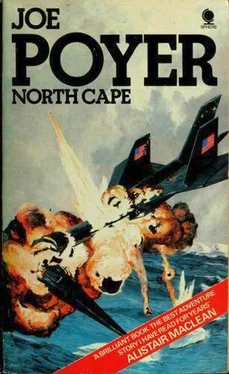Joe Poyer - North Cape
Здесь есть возможность читать онлайн «Joe Poyer - North Cape» весь текст электронной книги совершенно бесплатно (целиком полную версию без сокращений). В некоторых случаях можно слушать аудио, скачать через торрент в формате fb2 и присутствует краткое содержание. Город: London, Год выпуска: 1978, ISBN: 1978, Издательство: Sphere Books, Жанр: Триллер, на английском языке. Описание произведения, (предисловие) а так же отзывы посетителей доступны на портале библиотеки ЛибКат.
- Название:North Cape
- Автор:
- Издательство:Sphere Books
- Жанр:
- Год:1978
- Город:London
- ISBN:978-0-722-17006-9
- Рейтинг книги:4 / 5. Голосов: 1
-
Избранное:Добавить в избранное
- Отзывы:
-
Ваша оценка:
- 80
- 1
- 2
- 3
- 4
- 5
North Cape: краткое содержание, описание и аннотация
Предлагаем к чтению аннотацию, описание, краткое содержание или предисловие (зависит от того, что написал сам автор книги «North Cape»). Если вы не нашли необходимую информацию о книге — напишите в комментариях, мы постараемся отыскать её.
North Cape — читать онлайн бесплатно полную книгу (весь текст) целиком
Ниже представлен текст книги, разбитый по страницам. Система сохранения места последней прочитанной страницы, позволяет с удобством читать онлайн бесплатно книгу «North Cape», без необходимости каждый раз заново искать на чём Вы остановились. Поставьте закладку, и сможете в любой момент перейти на страницу, на которой закончили чтение.
Интервал:
Закладка:
In short, Teleman was carefully tailored to the aircraft and its missions. The reach the drugs allowed was marginal, yet enough to provide the control needed to handle his craft as no other airplane had ever been flown. Drugs kept him awake, or put him to sleep, instantly. Others kept him at the peak of alertness for as long as required and his mind focused on his Mission, his instruments, and his aircraft
CHAPTER 5
The great bend in the Oh River, one hundred miles east of the Siberian city of Tomsk, lay 180,000 feet below when the PCMS nudged Teleman out of sleep. Within three seconds he was awake and scanning the information displayed on the screen. The Electronics Countermeasures (ECM) bank had detected a series of searching radar beams within the past few minutes. Teleman got busy with the source detectors, concentrating closely on the sweep of the searching finger on the ECM screen. So far the radar beams were searching below eighty thousand feet, well below his present altitude. After a few minutes of concentrated work, he tracked the radar signals to their location — about where he had suspected. Four hundred miles farther down the Ob was the ancient city of Novosibirsk, one of the oldest of the tsarist Siberian exile camps. Now it was a booming industrial and mining center, containing one of the largest Soviet air bases. Novosibirsk was located at 800 miles north of the Soviet-Chinese border, and he suspected that the local commander of this tempting target was feeling just a bit jumpy this close to a hot war.
At the moment it appeared to be nothing more than routine searching by omni-radar. But the closer he approached to Novosibirsk, the more intense the weaving net of radar became and the greater the search altitude. For a minute his feeling of apprehension tightened, and Teleman wondered if they were on to him.
Fifteen minutes later he was approaching the northern rim of the Altai Mountain chain that ringed the western rim of the Mongolian Plateau. Beneath, the ground was still shrouded in darkness, sparsely broken by patches of light signifying inhabited communities. As he flew farther across the mountain range the lights became more and more scattered, until finally they ceased altogether. Now, far on the eastern horizon, he could make out the darker band of horizon that in less than an hour would be touched by the first tinges of dawn. The night-light television cameras displayed a scene of hellish grandeur in the uninhabited recesses of this most desolate of mountain ranges. The Altai range sprawled to three hundred miles wide on, its north-south axis, with peaks of thirteen thousand feet and higher thrusting jaggedly into the black sky. On either side of the range, deep, forbidding stretches of badland had been strewn about as if by a giant’s hand. The southern reach of badland and foothill was Teleman’s immediate destination, the stretch of land between the Altai and the smaller, but no less lofty, Tarbagatai range. More out of curiosity than anything else, he cranked the image up, increasing the magnification and resolution on the electronic telescopes until he was watching a strip of land less than three hundred yards wide slipping past. He was still on the northern face of the range, the gentler side, if that term could be applied to this waste of rock and ice. A few stunted trees, in miniature, appeared here and there. But nowhere could he find a trace of human habitation. This range of mountains was so barren that it was shunned even by the nomadic tribes of Mongolian sheepherders who drew a living from the wastes of the Gobi.
For the next half hour the A-17 passed over the mountains thirty-six miles below, until, on the eastern horizon, Teleman could make out the first indications of the approaching dawn. It would still be another hour and a half before the sun would reach into the valleys and canyons of the Tien Shan ahead, but the aircraft, reacting to the carefully prepared flight plan, began to throttle back and lose altitude. For long minutes Teleman watched the far-off ground sliding past; he was too slept out to sleep any longer and loath to request a barbiturate from the PCMS. As he sat debating with himself, the radar panel blipped for attention and projected a stream of swiftly flowing data that told Teleman that a flight of Soviet fighters was patrolling at thirty thousand feet. Teleman flipped a number of switches and got the radar tracking to trace their flight patterns. They were ahead and below nearly 130 miles south when first spotted. He was less than two hundred from the confluence of the Soviet, Mongolian, and Chinese borders and, as he guessed, the planes were merely another border patrol on a dawn sweep. Shortly, he was over the border into Red China, still at 140,000 feet and watching the Tarbagatai Mountains rounding on the horizon.
His target was now three hundred miles distant and Teleman assumed control of the aircraft. He throttled back and began losing altitude swiftly. The flight plan called for two long passes, one at a hundred thousand feet to survey the terrain and the other at forty thousand feet for close-ups. He was feeling extremely uneasy about the low-altitude pass, and the closer he approached to the target area the more uncomfortable he became. When the altimeters indicated one hundred thousand feet, he leveled off and cut his speed back still more to Mach 1.2, until he was barely crawling up on the Sinkiang highlands.
Twenty minutes to contact. The twisted, narrow Tarbagatai Mountain range slid behind and he was over the rugged highlands that edged the Gobi Desert. The rugged land of the Sinkiang plateau sped by as he slanted in. He started a long, seventy-five mile turn that would bring him onto a heading of 212° and into position to begin his search pattern along the border. As a safety precaution, Teleman began to crank the radar outward to its full — range of sixteen hundred miles and instructed the computer to keep watch and report anything that rose above eighty thousand feet. Then he turned his attention to the ECM console and began to narrow down the counterdetection radar cover to an area less than five miles across. All down the go° meridian Teleman had maintained a fifty-mile diameter ring, not enough to attract attention at the altitude he had been holding, but enough to prevent accidental detection.
Ten minutes to contact. All detection systems were silent. The low light-level television cameras were showing him apparent one-mile altitude shots along his flight path for ten miles on a side. He could make out no sign of life, no roads or tracks or signs of” human habitation. A few minutes before, he had left the desert and scrublands behind as the terrain climbed to eight thousand feet and became grasslands, depending for their meager water supply on the swift rivers flowing down out of the Tien Shan and its foothills. The winter was fierce, but the scouring winds had kept the sloping hillsides relatively free of snow below seven thousand feet. The plateau would rise another two to three thousand feet before cresting and beginning to flow downward toward the Kazakh border seventy miles west.
Fifty miles due east of his present position lay the Chinese city of Urmachi, probably the staging point for Chinese troops fighting in the hinterlands below. Off to the southeast glinted the frozen surface of the Kara Nor that would mark a rough position from which he would make a sharp turn to the northwest and fly up to the first checkpoint to pick up the star-fix coordinates for the border sweep.
As he made the turn the night-light TV cameras blanked for a moment, shifting resolution and iris assemblies as the sun began to brighten the snow-splotched landscape. He could still discern no sign of troop movements, or of life, period. But he knew he would, soon enough.
Now he was less than ten miles inside the Kazakh border, roughly paralleling the line the Soviets were reported to be holding. A swollen river rushing out of the hills, snow covered now, but green in the spring and early summer, slipped tantalizingly past on the ground surveillance screen. The countryside was deserted because of the winter and the war, but in more peaceful and warmer times, Mongolian and Tartar sheepherders shared the valleys, fresh steppe grass, and frequent small rivers from the mountains. In normal times they drove their flocks into the region for the long summer pasturage, peacefully net interfering with one another. Now, he knew, the valleys below were full of) radar sites, long-range missile and artillery positions, and troop concentrations of both sides. A range of pockmarked hills marched across the land that was beginning to fall away into a long valley stretching westward to the border. Abruptly the scene swam as the aircraft navigational sensors locked onto the proper stars and altered the course of the fleeting shadow until it was solidly on the wire. For the next hour the A-17 tacked back and forth across the irregular border, defined only by the series of star-fix coordinates held in magnetic tape. Teleman had completed the first pass at one hundred thousand. feet over the border city of Tahcheng and negotiated the turn-around point some sixty miles north. In manual control again, he was very carefully edging the aircraft down to forty thousand feet, the lowest he had ever flown over enemy territory. He knew that he could be sighted visually by either side and hoped that the lack of radar fixes would be, thought due to opposition countermeasures. Just in case, he warmed up the decoy rigs and slapped them onto standby. If radar beams came questing after him, their distinctive pulse patterns could be analyzed. The ECM would then broadcast high-frequency radio signals up and down several bandwidths. This would have the effect of presenting to the radar operator a broken, rapidly flickering signal that hopefully would be blamed on freak atmospheric conditions.
Читать дальшеИнтервал:
Закладка:
Похожие книги на «North Cape»
Представляем Вашему вниманию похожие книги на «North Cape» списком для выбора. Мы отобрали схожую по названию и смыслу литературу в надежде предоставить читателям больше вариантов отыскать новые, интересные, ещё непрочитанные произведения.
Обсуждение, отзывы о книге «North Cape» и просто собственные мнения читателей. Оставьте ваши комментарии, напишите, что Вы думаете о произведении, его смысле или главных героях. Укажите что конкретно понравилось, а что нет, и почему Вы так считаете.












